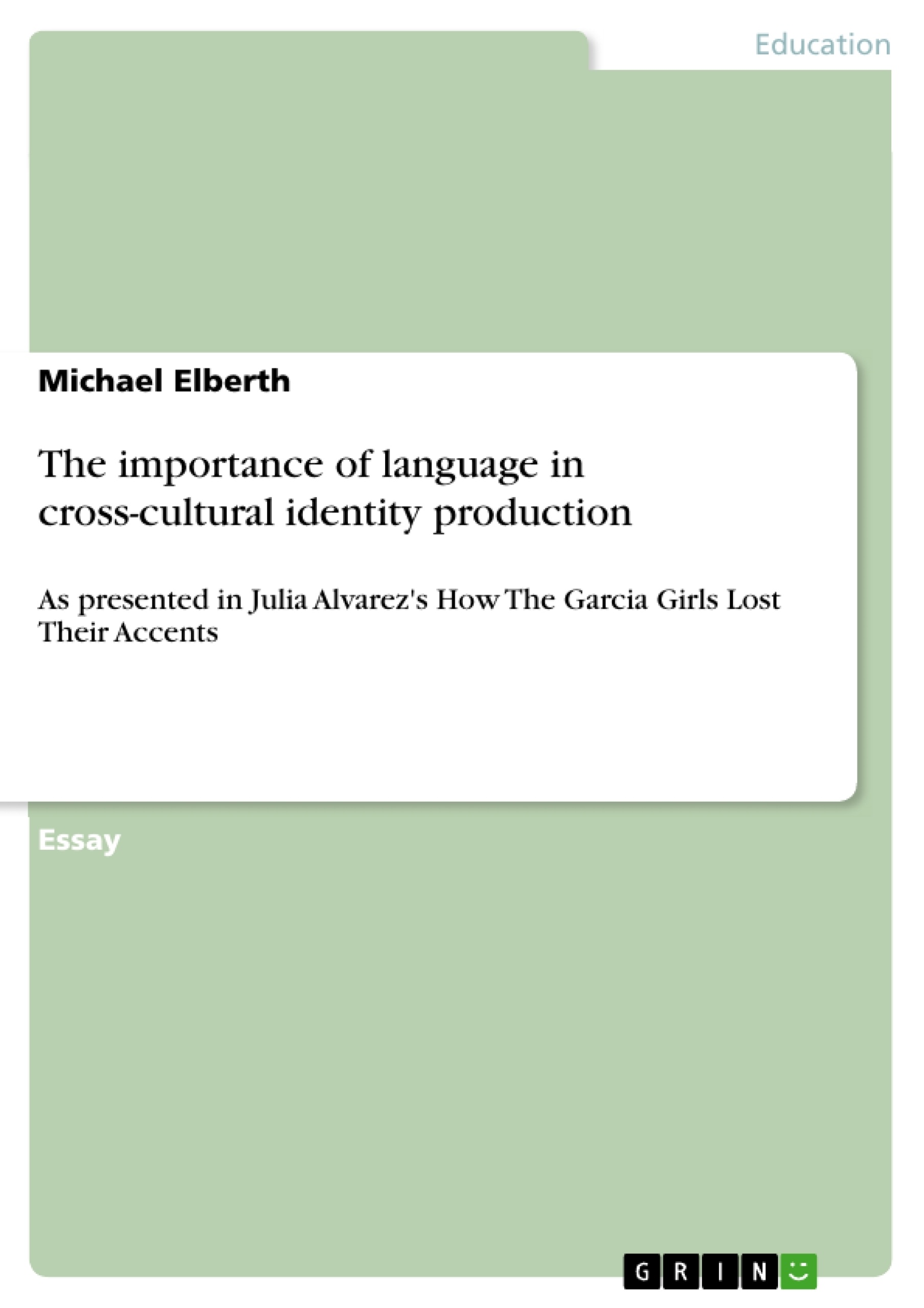At the centre of Julia Alvarez’s novel How the Garcia Girls Lost Their Accents stands the Dominican girl Yolanda, who moved to America as a youth. Since then, she has often been back in the Dominican Republic to visit her family and maintain a close link to her cultural origin. Yolanda’s identity is strongly influenced by the two cultures, which makes her a cultural hybrid.
This essay will show the important role that language plays in the production of cross-cultural identity as can be seen in the development of Yolanda. Furthermore, the essay will only focus on her English language development in the American environment, excluding the scenes where Yolanda is back in the Dominican Republic for visits.
Inhaltsverzeichnis (Table of Contents)
- The Importance of Language in Cross-Cultural Identity Production as Presented in Julia Alvarez's How the Garcia Girls Lost Their Accents
- The Notion of Identity
- Yolanda's Experience in the US
- The Importance of the English Language
- The Impact of the English Language on Yolanda
- Yolanda's Struggle with Her Identity
- Yolanda's Appropriation of the English Language
- Representation as a Means of Constructing Identity
- The Negative Side Effects of Hybridity
- The Importance of the English Language for Yolanda
- Yolanda's Identity as a Result of Representation
Zielsetzung und Themenschwerpunkte (Objectives and Key Themes)
This essay analyzes the role of language in shaping cross-cultural identity, specifically focusing on the character Yolanda in Julia Alvarez's novel, How the Garcia Girls Lost Their Accents. The essay explores the impact of the English language on Yolanda's development and her experiences navigating American culture while maintaining a connection to her Dominican heritage.
- The concept of identity as a dynamic and fluid construct
- The impact of language on identity formation
- The challenges and opportunities of cross-cultural identity
- The role of language in communication and understanding
- The influence of cultural experiences on identity development
Zusammenfassung der Kapitel (Chapter Summaries)
The essay begins by examining the concept of identity, drawing upon sociologist Stuart Hall's notion of identity as a “production” that is constantly in process and shaped by representation. The essay then focuses on Yolanda's experiences in the US, highlighting the significant role the English language plays in her identity development. The text explores how Yolanda's interactions in school, public life, and personal relationships shape her understanding of herself and her place in American society.
The essay continues by discussing the various ways Yolanda learns and utilizes the English language, including her early exposure to the language in the Dominican Republic, her experiences in American schools, and her encounters with both positive and negative social interactions. The essay further examines how Yolanda's growing proficiency in English leads her to appropriate the language for her own communication and expression.
Schlüsselwörter (Keywords)
The essay centers around the themes of identity, language, cross-cultural identity, representation, cultural hybridity, and communication. It examines the impact of language on shaping a person's understanding of themselves within a multicultural environment. The essay also explores the concept of cultural hybridity, highlighting the challenges and complexities of navigating multiple cultural identities. The work draws upon the ideas of Stuart Hall and Edward Said to provide theoretical frameworks for understanding identity and cross-cultural communication.
Frequently Asked Questions
How does language influence Yolanda's identity?
For Yolanda, the English language is a tool for assimilation and self-expression in America, creating a cultural hybrid identity between her Dominican roots and her new life.
What is "cultural hybridity"?
It is the blending of different cultural influences to form a new, dynamic identity, as seen in immigrants who navigate multiple cultural worlds.
Who is Stuart Hall and why is his theory relevant?
Stuart Hall was a sociologist who viewed identity as a "production" that is never complete and always shaped by representation and history.
What struggles does Yolanda face with the English language?
She struggles with the nuances of meaning, the pressure to lose her accent, and the feeling of being caught between two linguistic worlds.
How is identity constructed through representation?
Identity is formed by how we are portrayed by others and how we choose to portray ourselves through language and cultural symbols.
- Quote paper
- Michael Elberth (Author), 2010, The importance of language in cross-cultural identity production, Munich, GRIN Verlag, https://www.grin.com/document/164444



